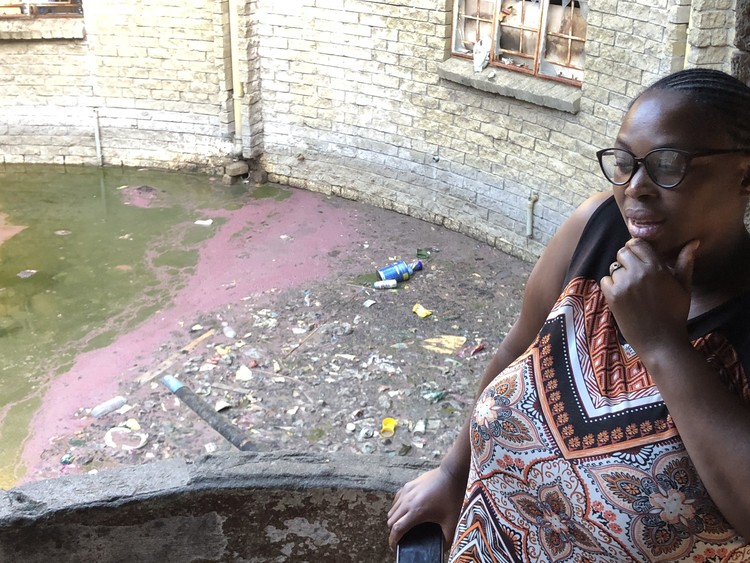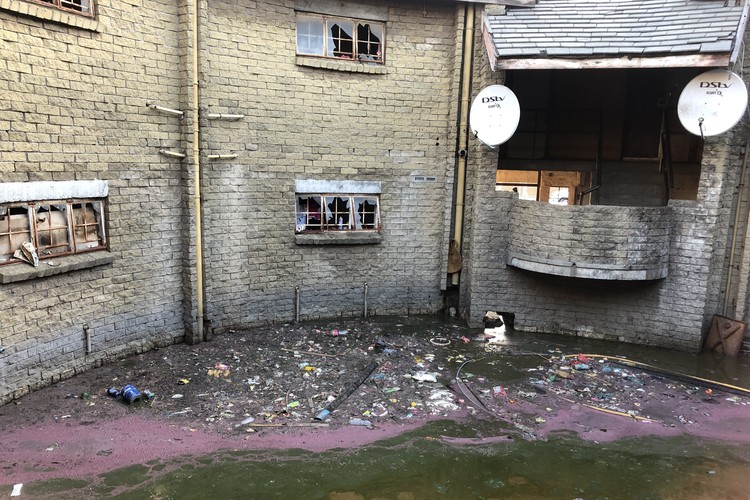Rats, cockroaches, rubbish: life in an abandoned apartheid hostel
The 34-roomed dome building has been abandoned for about 20 years and no one has taken responsibility for fixing it
Nolukholo Nzala has lived in an abandoned hostel building in Gugulethu, Cape Town, for eight years. Photos: Mary-Anne Gontsana
- Officials from the Western Cape Department of Environmental Affairs and Development Planning will visit families living in an abandoned building in Gugulethu later this month.
- Residents say their situation has deteriorated in two years and is particularly unbearable on hot days.
- Most of the doors to the 34 apartments are closed with chains and padlocks. All the windows are broken and covered with cardboard. The communal bathrooms do not have a ceiling and none of the toilets flush.
- The City has said that it cannot assist with services because the building is privately owned. But the owners have died and the company that owns it has been deregistered.
A strong stench of decay hangs in the air around a shallow pool of stagnant water filled with algae and rubbish. The pool fills the centre courtyard seen from the first-floor balcony of a dilapidated building in Gugulethu, Cape Town.
“That is my view every day while I live in my toilet-sized flat,” says Bulelwa Papu. She lives in one of the 34 small rooms in the dome-shaped building near Kanana informal settlement.
We first visited the occupied building in August 2021. Conditions were filthy and toilets were broken. Now residents say their situation has deteriorated even more and life is unbearable on hot days.
“We have rats, mice, flying cockroaches and geckos. My arms have these bumps all over with mosquito bites,” says Nolufefe Zondani, who has been living in one of the flats for about 20 years.
Most of the doors have no handles and residents use chains and padlocks to lock them. All the windows are broken and covered with cardboard to keep some of the cold wind and rain out. The communal bathrooms and toilets do not have a ceiling and the toilets do not flush.
Residents say they are desperate for help and have asked the City of Cape Town on a number of occasions, but the property is privately owned.
This pink stagnant water covers the centre of the building’s courtyard and smells of decay.
“We have no water in the building. We share one communal tap outside by the entrance. When you need the toilet, you first have to fill a bucket of water then take it with you to flush the toilet,” says Zondani.
Another resident Zameka Ntlombe says most of the residents living in the building are unemployed. “Most of us are on the housing list waiting. We are waiting for the day when we can get our own homes and leave this place because it doesn’t seem like anybody’s prepared to fix it. I have been on the housing list since 2005,” says Ntlombe.
Following GroundUp’s article in 2021, GOOD party general secretary, Brett Herron, visited residents in the building twice. He approached the provincial Department of Environmental Affairs and Development Planning. The building was built as a hostel for “migrant labourers” by private property developers at the height of apartheid.
“Because the hostels weren’t built by the state, they are regarded as private property by the City of Cape Town. As a consequence, residents can’t rely on the City for services.
“Instead of abandoning these people, the City would be well-advised to demonstrate responsible leadership by expropriating the hostels and making them fit for human habitation,” said Herron.
In response to Herron’s request, Environmental Affairs and Development Planning department spokesperson Rudolf van Jaarsveldt said officials had conducted an inspection in November last year.
“Since no significant degradation of the environment was detected on the day of the inspection, the issuing of a notice could not be justified.”
Van Jaarsveldt said officials from the department plan to do a follow-up inspection later this month. “This will be followed by the issuance of either a warning letter or pre-directive to the landowner, instructing him to take the necessary legal steps to ensure the safety and wellbeing of people residing in the hostel,” he said.
The ward councillor had acknowledged that the building is falling apart. He had told GroundUp that the City’s hands were tied because the municipality cannot provide services on private property without the owner’s consent.
Who owns the property?
Determining the owner of the property has proven to be a mission. First, we asked the City and the Department for the details of the owner but we were informed this information could not be shared without the permission of the owner.
The City’s Wayne Dyason said, “Problem Building Unit confirms that the property can be investigated in terms of the Problem Building Bylaw, 2020. The POPIA Act and other legislation dictates that the City is not allowed to share such information without the permission of the owner.” [We are unconvinced this is a correct legal interpretation of POPIA - GroundUp editor.]
A standard search of property databases didn’t elicit much information. But with the assistance of a lawyer, we managed to find that the property was bought by G and W Leases in the 1990s. This closed corporation’s members were Sydney Wolpert and Leon Glaser, both of whom have died. The corporation itself was deregistered in July 2010, but it remains the registered owner of the property.
A lawyer informed us that the City does have the power to declare the building derelict and to expropriate the property, something it does quite often.
Next: “A state of destruction”: Activists gather at SONA to demand an end to rolling blackouts
Previous: “Total madness”: Fishers protest against ocean drilling
© 2023 GroundUp. This article is licensed under a Creative Commons Attribution-NoDerivatives 4.0 International License.
You may republish this article, so long as you credit the authors and GroundUp, and do not change the text. Please include a link back to the original article.
We put an invisible pixel in the article so that we can count traffic to republishers. All analytics tools are solely on our servers. We do not give our logs to any third party. Logs are deleted after two weeks. We do not use any IP address identifying information except to count regional traffic. We are solely interested in counting hits, not tracking users. If you republish, please do not delete the invisible pixel.




